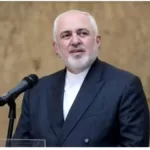Renowned climate activist Greta Thunberg faced criticism in Germany for her pro-Palestinian stance during a climate protest in Amsterdam. Clad in a Palestinian black and white scarf, Thunberg called for a ceasefire in the Gaza crisis, leading to a confrontation with a dissenting individual at the event. The local chapter of Fridays for Future, the climate movement Thunberg is associated with, distanced itself from her views on the Gaza situation.
Thunberg’s statements drew reproach from various quarters, with Ricarda Lang, co-leader of the Greens, a junior partner in Chancellor Olaf Scholz’s coalition, accusing her of misusing the climate protection cause to take a one-sided position on the Israel-Palestinian conflict. Lang emphasized that Thunberg failed to condemn the actions of Hamas, thereby discrediting herself as a representative of the climate movement.
Volker Becker, the president of the German-Israel Society DIG, went further, asserting that Thunberg’s statements in Amsterdam marked the end of her tenure as a climate activist. He declared that henceforth, her primary role would be perceived as that of an “Israel hater.”
This controversy underscores the delicate balance activists navigate when addressing multifaceted global issues, with Thunberg’s pivot drawing attention to the intersection of climate activism and geopolitical complexities.







